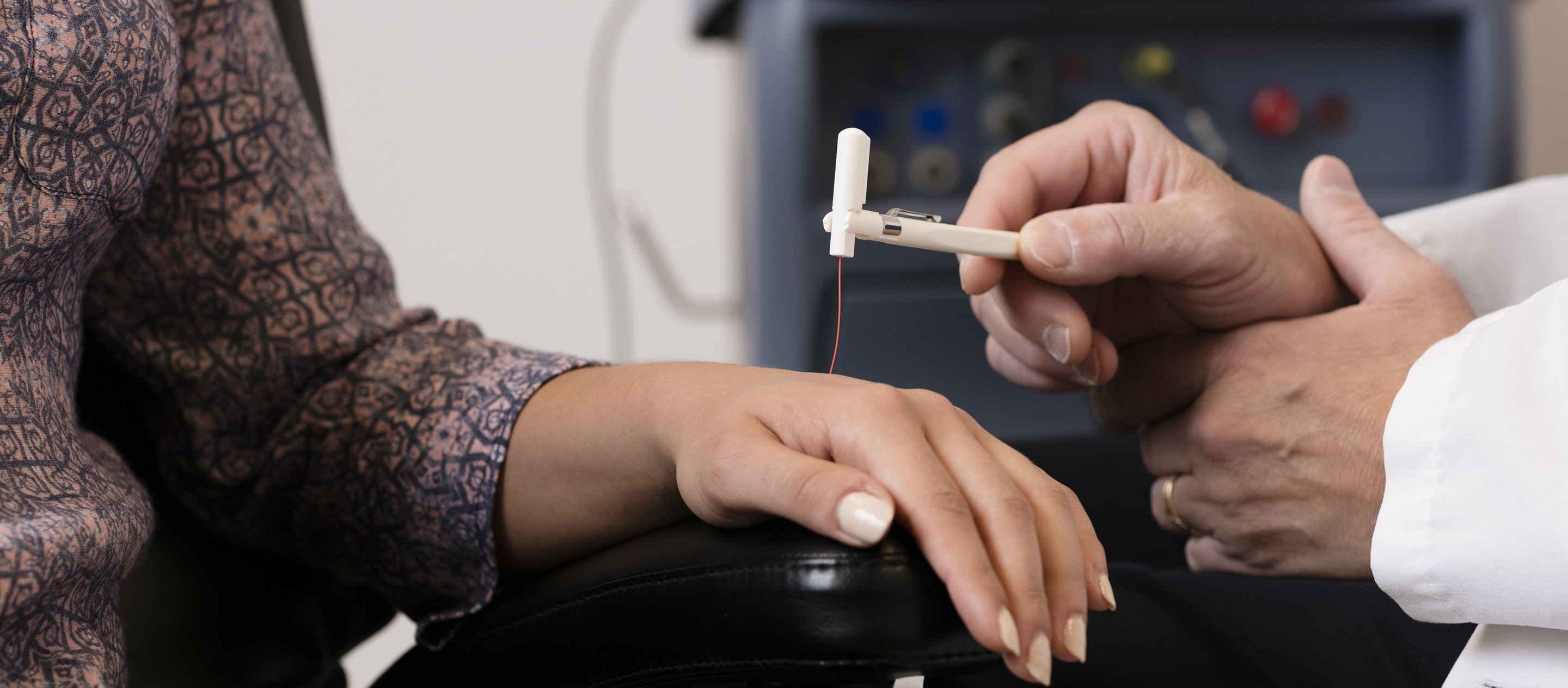
Learn about the current research being conducted below. For additional information, please visit The Colloca Lab website.
“Neural correlates of hypoalgesia driven by observation”
National Center for Complementary & Integrative Health (NCCIH) of the National
Institutes of Health (NIH), R01AT01033
Colloca L, PI
2019 - 2024
Project goal: Investigating the brain mechanisms of hypoalgesia driven by observing analgesia induced in another individual using fMRI, EEG and EEG/fMRI techniques.
Placebo effects held an ambivalent place in health care for at least two centuries; they have shifted from being a clinical-trial challenge to a neurophysiology-based pain-reduction resource. This is relevant in acute pain settings given that chronic opioid users die within approximately 2.5 years of being prescribed their first opioid medication to treat acute pain. In this project, we propose a compelling research agenda to explore the neural mechanisms of hypoalgesia driven by observation as a foundation for future development of novel non-pharmacological pain therapies using pharmacological functional magnetic resonance imaging (fMRI), electroencephalography (EEG), and combined EEG/fMRI. It builds on a decade of experience in placebo research in PI Colloca’s lab and with University of Maryland collaborators experienced in brain mapping and pain research.
If you are interested in participating in this research study, fill out this screening form.
“Secondary Analysis and Integration of Existing Data Related to Chronic Orofacial Pain and Placebo Effects”
National Institute of Dental & Craniofacial Research (NIDCR) of the National Institutes of Health (NIH), 1R21 DE032532
Colloca L, PI
2022 - 2024
Project goal: Identifying biomarkers of placebo responsivity
Recent studies suggest that genetics plays an important role in pain sensitivity and modulation, and can increase the susceptibility to developing chronic pain and TMD, disorders that are both costly and common. Furthermore, the individual pain experience and responses to treatments is highly variable, and about 50% of that variability can be afforded to expectancy-induced analgesia. To improve the effectiveness of treatments by increasing understanding of individual variability, we study how genetics affects expectancy-induced analgesia. We have developed a novel and comprehensive genetic, behavioral and imaging approach to study the role of genetic variations on behavioral, psychological and neuronal mechanisms of expectancy-induced analgesia in patients with TMD.
Past completed grant projects:
“3rd International conference of The Society for Interdisciplinary Placebo Studies, SIPS - Harnessing placebo mechanisms for optimal pain management and treatment of alcohol and other drug use disorders”
National Institute on Alcohol Abuse and Alcoholism (NIAAA), R13AA028424
Colloca L, Seneviratne, MPI
2020-2022
Project goals: Organizing the 3rd International conference of The Society for Interdisciplinary Placebo Studies (SIPS) in placebo, pain and addiction.
This project was designed, planned and organized an interdisciplinary, international scientific conference to advance the science of placebo research and mind-body mechanisms, and apply this knowledge to alcohol use and pain disorders. For example, placebo responses in alcohol use disorder treatment trials ranges from 20.8% to 94%. An in-depth discussion during the conference expanded knowledge of placebo responsiveness, design of clinical trials and integration of nonpharmacological approaches as a relevant and unique opportunity to improve patients’ outcomes, quality of life and functioning.
The three central AIMs for the 2021 conference at UMB were: 1. Provide a collaborative platform to present and share innovative research findings and theoretical ideas on placebo research to a national and an international audience of researchers. 2. Promote training and education of trainees, academic junior researchers, healthcare professionals, agencies, and the public. 3. Advocate for the participation of minorities and women while expanding research in the global network of placebo research. The Interprofessional Continuing Education Committee and selected faculty from UMB collaborated with the Society for Interdisciplinary Placebo Studies (SIPS) to design and produce this unique 2.5-day event. SIPS was created in 2014, with the mission of promoting interdisciplinary investigation of placebo and nocebo phenomena (https://sipsconference.com/).
“3rd International conference of The Society for Interdisciplinary Placebo StudiesSIPS - Harnessing placebo mechanisms for optimal pain management and treatment of alcohol and other drug use disorders”
Forschungsgemeinschaft - 3rd International Conference of the Society for Interdisciplinary Placebo Studies
Colloca L, PI (donation)
2020-2022
Project goals: Support for Organizing the 3rd International conference of The Society for Interdisciplinary Placebo Studies (SIPS) and its deliverables.
“3rd International conference of The Society for Interdisciplinary Placebo Studies SIPS - Harnessing placebo mechanisms for optimal pain management and treatment of alcohol and other drug use disorders”
Samueli Foundation
Colloca L, PI (donation)
2020-2022
Project goals: Support for Organizing the 3rd International conference of The Society for Interdisciplinary Placebo Studies (SIPS) and its deliverables.
“Exploring the role of vasopressin in socially-induced hypoalgesia”
UMB Institute for Clinical and Translational Research (ICTR)
Colloca L, Gullapalli, MPI
2018-2020
Project goals: To determine how vasopressin modulates social observational learning of placebo analgesia
“Development of Phone Based Applications to Relieve Traumatic Pain and Prevent Substance Use Related to Long-Term Use of Opioids”
UMB Center for Addiction Research, Education, and Service (CARES)
Colloca L, Murthi, S, MPI
2018-2019
Project goals: To develop a phone application to prevent opioids abuse in pain patients and shape expectations of opioid intake needs.
“Ketamine-like effects and conditioning in a mouse model of neuropathic chronic pain”
Center to Advance Chronic Pain Research (CACPR), UMB
Colloca L, Lessans S. and Gould T, MPIs
2016-2018
Project goal: Explore neural and genetics biomarkers of placebo analgesia in laboratory settings including new pilot studies on social learning and RNA gene expression and pain.
"Open-label dose-extending placebos as an adjunct to methadone treatment”
Foundation for the Science of the Therapeutic Encounter (F-STE)
Colloca L, Annabelle Belcher, MPI
2017-2018
Project goals: Explore the role of placebos given with methadone to minimize the escalation of methadone in patients suffering from addiction by comparing the impact of open-label dose-extending placebo to Treatment as Usual (TAU) on ultimate methadone dose achieved.